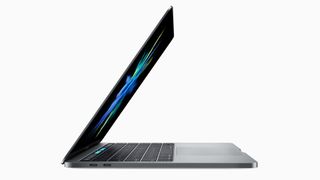Ultra-thin laptops like the MacBook and Surface could be endangering our planet
So long and thanks for all the glue

Greenpeace has produced a new report condemning some contemporary ultra-thin laptops – specifically Apple’s MacBooks and Microsoft’s Surface devices – for failing in a big way on the design front when it comes to being environmentally friendly.
The study compiled by Greenpeace East Asia, which uses the ‘repairability’ ratings from the teardown experts at iFixit, looked at electronic waste (e-waste) – laptops being chucked in the bin because they aren’t designed with being upgraded or repaired in mind.
Greenpeace examined a number of laptops and hybrids (as well as tablets and smartphones) launched since 2015, and singled out the new MacBooks (as well as some older MacBook models), Surface Book and Surface Pro 4 for criticism.
As we’ve seen recently, the new MacBooks (and also the Surface Laptop) have scored very poorly in iFixit teardowns, mainly due to the use of soldered components which mean the notebooks can’t be upgraded to keep them relevant in the future – and the overuse of glue to keep things like the battery in place.
Designers may be making modern laptops which are very thin and sleek due to being able to pack all the components in thanks to these sort of measures, but this makes them less repairable if anything goes wrong, and more likely to end up contributing to our landfill disaster (the specter of which is gradually creeping over the Earth).
Doing it right
Greenpeace further highlighted a lack of information on repairing devices, and of all the notebook manufacturers covered in the report, only Dell and HP provided a full set of spare parts, along with manuals for carrying out repairs.
And on a more positive note, some of Dell’s and HP’s laptops were strongly commended in the report for doing everything right in terms of needing no special tools to access the inside of the machine, and allowing for both the battery and display to be replaced easily.
Get daily insight, inspiration and deals in your inbox
Get the hottest deals available in your inbox plus news, reviews, opinion, analysis and more from the TechRadar team.
Kyle Wiens, CEO of iFixit, commented: “Electronics take a massive amount of energy, human effort, and natural resources to make. And yet, manufacturers produce billions more of them every year – while consumers keep them for just a few years before tossing them away. E-waste is one of the fastest growing waste streams in the world. We should be able to make electronics a more sustainable part of our lives.”
On the phone front, incidentally, both Samsung and LG were criticized for producing handsets which are becoming ‘increasingly less repairable’.
Via: ComputerWeekly
- How environmentally friendly are the best laptops of 2017?
Darren is a freelancer writing news and features for TechRadar (and occasionally T3) across a broad range of computing topics including CPUs, GPUs, various other hardware, VPNs, antivirus and more. He has written about tech for the best part of three decades, and writes books in his spare time (his debut novel - 'I Know What You Did Last Supper' - was published by Hachette UK in 2013).
Most Popular

